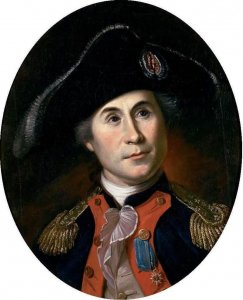Today in Naval History - Naval / Maritime Events in History
19th of July
some of the events you will find here,
please use the following link where you will find more details and all other events of this day .....
17 July 1717 – King George I of Great Britain sails down the River Thames with a barge of 50 musicians, where George Frideric Handel's Water Music is premiered. The first performance of the Water Music suites is recorded in The Daily Courant, the first British daily newspaper. At about 8 p.m...
shipsofscale.com
1588 - The Spanish Armada is sighted in the English Channel. First day of the planned invasion of England by the spanish.
The
Spanish Armada (Spanish:
Grande y Felicísima Armada, literally "Great and Most Fortunate Navy") was a
Spanish fleet of 130 ships that sailed from
A Coruña in late May 1588, under the command of the
Duke of Medina Sidonia, with the purpose of escorting an army from
Flanders to invade
England. The strategic aim was to overthrow
Queen Elizabeth I and her
establishment of Protestantism in England, with the expectation that this would put a stop to English interference in the
Spanish Netherlands and to the harm caused to Spanish interests by English and Dutch
privateering.
1717 - The naval Battle of Matapan
took place on 19 July 1717 off the
Cape Matapan, on the coast of the
Mani Peninsula in southern
Greece, between the
Armada Grossa of the
Republic of Venice, supported by a mixed squadron of allied ships from
Portugal, the
Papal States and
Malta, and the Ottoman fleet, under
Kapudan Pasha Eğribozlu İbrahim Pasha.
Leon Trionfante 80 guns
1790 - The naval Battle of Kerch Strait
(also known as Battle of Yenikale, by the old Turkish name of the strait near
Kerch) took place on 19 July 1790 near
Kerch,
Crimea, and was a slight victory for
Imperial Russia over the
Ottoman Empire during the
Russo-Turkish War, 1787-1792.
1812 - USS Constitution (1797) (44), Isaac Hull, escapes from British squadron after 3 day chase off New Jersey
War was declared on 18 June and Hull put to sea on 12 July, attempting to join the five ships of a squadron under the command of Rodgers in
President. He sighted five ships off Egg Harbor, New Jersey on 17 July and at first believed them to be Rodgers' squadron but, by the following morning, the lookouts determined that they were a British squadron out of Halifax:
HMS Aeolus,
Africa,
Belvidera,
Guerriere, and
Shannon. They had sighted
Constitution and were giving chase.
Constitution during the chase
1843 - disastrous Lauching / Floating out of SS Great Britain, the second ship of
Isambard Kingdom Brunel
Conditions were generally favourable and diarists recorded that, after a dull start, the weather brightened with only a few intermittent showers. The atmosphere of the day can best be gauged from a report the following day in
The Bristol Mirror:
Large crowds started to gather early in the day including many people who had travelled to Bristol to see the spectacle. There was a general atmosphere of anticipation as the Royal Emblem was unfurled. The processional route had been cleaned and Temple Street decorated with flags, banners, flowers and ribbons. Boys of the City School and girls of Red Maids were stationed in a neat orderly formation down the entire length of the Exchange. The route was a mass of colour and everybody was out on the streets as it was a public holiday. The atmosphere of gaiety even allowed thoughts to drift away from the problems of political dissension in London.
Prince Albert arrived at 10 a.m. at the Great Western Railway terminus. The
royal train, conducted by Brunel himself, had taken two hours and forty minutes from London. There was a
guard of honour of members of the police force, soldiers and dragoons and, as the Prince stepped from the train, the band of the Life Guards played works by Labitsky and a selection from the "Ballet of Alma". Two sections of the platform were boarded off for the reception and it was noted by
The Bristol Mirror that parts were covered with carpets from the Council House. The Prince Consort, dressed as a private gentleman, was accompanied by his
equerry-in-waiting, personal secretary, the
Marquess of Exeter, and Lords
Wharncliffe,
Liverpool,
Lincoln and
Wellesley.
Launch of
Great Britain at Bristol, July 1843
1940 - The Battle of Cape Spada
was a
naval battle during the
Battle of the Mediterranean in
Second World War. It took place on 19 July 1940 in the
Mediterranean Sea off
Cape Spada, the north-western extremity of
Crete.
Italian cruiser Bartolomeo Colleoni under attack from HMAS Sydney and destroyer flotilla
1979 - The oil tanker SS Atlantic Empress collides with another oil tanker Aegean Captain, causing the largest ever ship-borne oil spill, 18 miles east of the island of
Tobago.
At the time of the collision
Atlantic Empress was sailing from Saudi Arabia to
Beaumont, Texas, with a cargo of
light crude oil owned by
Mobil Oil.
Aegean Captain was en route to Singapore from
Aruba.
In heavy rain and thick fog the two ships did not sight each other until they were 600 yards (550 m) apart.
Aegean Captain changed course, but it was too late, and at 7:15 p.m the two ships collided, with the
Empresstearing a hole in the
Captain's starboard bow. Large fires began on each ship, which were soon beyond the control of the crews, who abandoned their ships.



